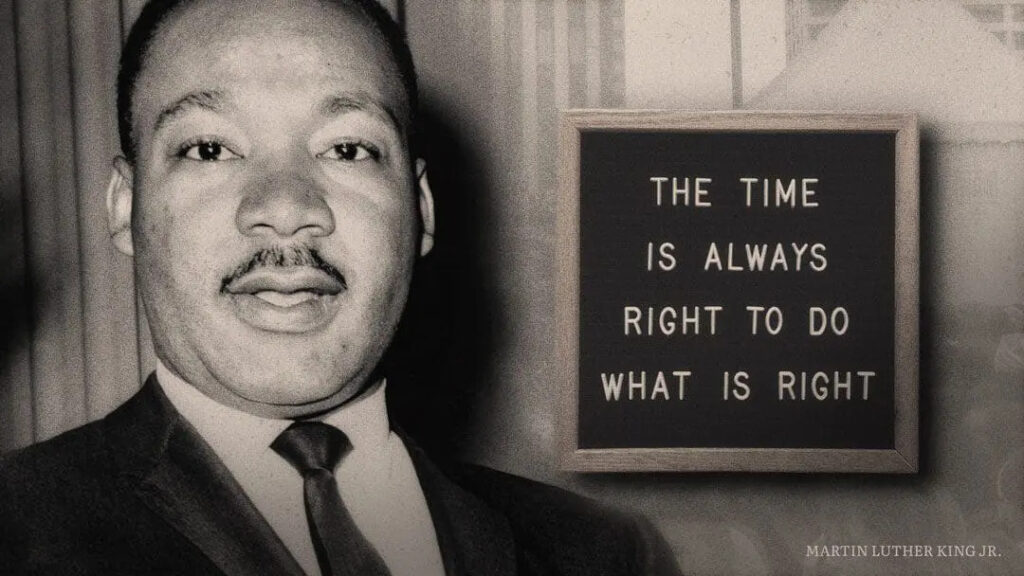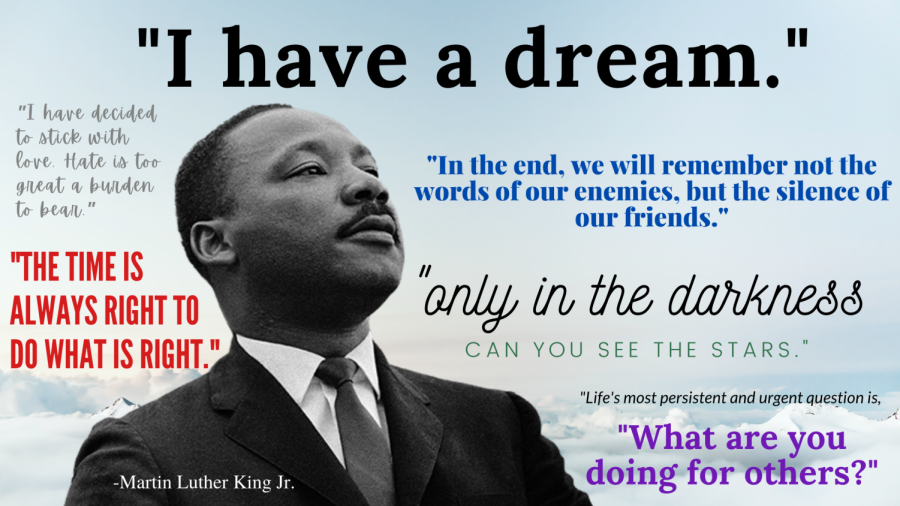Table of Contents
ToggleTop 50 Amazing Facts About Martin Luther King Jr.
Born in Atlanta, Georgia, on January 15, 1929, Martin Luther King Jr. played a crucial role as a leader in the American Civil Rights Movement. King, a Baptist clergyman, devoted his life to using nonviolent methods to remove racial discrimination and advance equality. His stirring speeches, such as the well-known “I Have a Dream” he gave at the 1963 March on Washington, inspired millions of people and raised awareness of the difficulties African Americans confront throughout the world.
One of the first significant successes against segregation came from King’s leadership of the Montgomery Bus Boycott (1955–1956), which got started when Rosa Parks was arrested for refusing to give up her bus seat. Mahatma Gandhi’s peaceful protest attitude won him worldwide recognition and ultimately resulted in important legislation improvements like the Voting Rights Act of 1965 and the Civil Rights Act of 1964.

King was tragically killed in Memphis, Tennessee, on April 4, 1968. The world was shocked by his passing, yet his legacy lives on. A symbol of justice and hope, he is honored today. In the United States, his birthday is observed yearly as Martin Luther King Jr. Day, a day for service and contemplation on equality.
As relevant as ever, King’s dream of a society in which individuals “will not be judged by the color of their skin but by the content of their character” serves as an inspiration for ongoing social justice and human rights campaigns around the globe.
This blog dives into 50 unknown and amazing facts about Martin Luther King Jr., shedding light on the many aspects of his extraordinary life.
1. Born Michael King Jr.
While known globally as Martin Luther King Jr., he was originally born as Michael King Jr. His father, Michael King Sr., changed both their names in honor of the Protestant reformer Martin Luther after visiting Germany in 1934.
2. Early Academic Excellence
King was a brilliant student, skipping both the ninth and twelfth grades. He entered Morehouse College at the age of 15 without officially completing high school.
3. Youngest Nobel Peace Prize Winner at the Time
In 1964, Martin Luther King Jr. won the Nobel Peace Prize at the age of 35, becoming the youngest laureate of the prize at the time. He donated the $54,123 prize money to the civil rights movement.
4. Fluent in Latin
King had a strong academic background in languages, including Latin. During his school years, he excelled in his Latin classes, demonstrating his intellectual prowess from an early age.
5. Sought Out Inspiration from Gandhi
Although King had always been inclined toward peaceful methods, his commitment to nonviolence solidified after studying Mahatma Gandhi’s philosophy of nonviolent resistance during a trip to India in 1959.
6. Ordained as a Minister at 19
Following in his father’s footsteps, King became ordained as a Baptist minister at the young age of 19. He would go on to preach at his father’s church, Ebenezer Baptist Church, in Atlanta.
7. King Was Arrested 29 Times
During his fight for civil rights, King was arrested 29 times, mainly for acts of civil disobedience and minor traffic violations. He viewed these arrests as necessary sacrifices in the fight for justice.
8. His “I Have a Dream” Speech Was Improvised
One of King’s most famous moments, the “I Have a Dream,” was partially improvised. Gospel singer Mahalia Jackson, present at the march, urged him to “Tell them about the dream, Martin!” He then launched into the most iconic part of his speech.
9. Assassination Wasn’t His First Brush with Death
In 1958, a mentally ill woman named Izola Curry stabbed King in the chest with a letter opener during a book signing in Harlem. The blade was dangerously close to his aorta, and doctors said that if he had sneezed, he would have died.
10. King’s Legacy Honored with a National Holiday
In 1983, President Ronald Reagan signed the bill making Martin Luther King Jr. Day a federal holiday, to be observed every third Monday in January. This marked a significant recognition of his contributions to civil rights.
11. Earned a Doctorate in Systematic Theology
King received his Ph.D. in Systematic Theology from Boston University in 1955. His dissertation focused on the influence of Paul Tillich and Henry Nelson Wieman on his theology.
12. A Fan of Star Trek
King was a fan of the television show Star Trek. He personally persuaded actress Nichelle Nichols, who played Lt. Uhura, to stay on the show when she considered leaving, citing the importance of her role as a Black woman in a position of authority.
13. King’s Parents Were Activists
King’s activism was deeply rooted in his family. His father, Martin Luther King Sr., was also an activist, involved in early efforts to desegregate schools and public spaces in Atlanta.
14. Montgomery Bus Boycott Was His First Major Protest
In 1955, King led the Montgomery Bus Boycott after Rosa Parks was arrested for refusing to give up her seat to a white person. This protest lasted 385 days and helped dismantle segregation in public buses.
15. Inspired the Civil Rights Act of 1964
King’s efforts and leadership were crucial in the passage of the Civil Rights Act of 1964, which outlawed discrimination based on race, color, religion, sex, or national origin.

16. His House Was Bombed
During the Montgomery Bus Boycott, King’s house was bombed by opponents of the civil rights movement. Fortunately, his family was unharmed.
17. He Spoke Out Against the Vietnam War
In 1967, King delivered a controversial speech denouncing the U.S. involvement in the Vietnam War, calling it an unjust war. This stance made him unpopular with many political figures at the time.
18. Time Magazine’s Man of the Year
In 1963, King was named Time magazine’s “Man of the Year,” becoming the first African American to receive the honor. This marked a significant moment of recognition for his work on civil rights.
19. Married Coretta Scott King
In 1953, King married Coretta Scott, a civil rights activist and talented singer. Together, they became a power couple, advocating for equality and justice.
20. King’s Favorite Hymn: “Take My Hand, Precious Lord”
King loved the hymn “Take My Hand, Precious Lord.” It was played at his funeral and was a song he often requested during marches and protests.
21. MLK Jr. Had a Sense of Humor
Despite the gravity of his work, King had a great sense of humor. He often used jokes to lighten the mood during tense meetings and strategy sessions.
22. King Faced Criticism from Fellow Civil Rights Leaders
King’s commitment to nonviolence was not always universally accepted, and some fellow civil rights leaders criticized him for not being militant enough, particularly figures like Malcolm X.
23. He Was Under FBI Surveillance
The FBI, under the direction of J. Edgar Hoover, kept a close watch on King and his activities, wiretapping his phones and trying to discredit him with accusations of Communist sympathies.
24. King Met with Malcolm X Once
Although King and Malcolm X had different approaches to achieving racial justice, the two leaders met briefly in 1964, just before Malcolm X’s assassination. It was their only meeting.
25. Prominent Leader in the Southern Christian Leadership Conference (SCLC)
King co-founded the SCLC in 1957, an organization committed to nonviolent protests and civil rights. He served as its first president.
26. King Was a Vegetarian
King began following a vegetarian diet in the last years of his life. His widow, Coretta Scott King, became a strict vegetarian and animal rights activist later in her life.
27. King’s First Speech Was a Public Failure
In 1944, King delivered his first public speech at a contest organized by the Negro Elks, but he lost. Despite this early setback, it didn’t deter him from becoming a powerful orator later in life.
28. King Was Denied the Right to Vote
Despite his leadership in the civil rights movement, King himself faced voter suppression when he was denied the right to vote in the 1940s due to discriminatory practices in Georgia.
29. Deeply Influenced by Henry David Thoreau
King was greatly influenced by Henry David Thoreau’s essay “Civil Disobedience,” which advocated nonviolent resistance to unjust laws, forming a philosophical foundation for his activism.
30. King Delivered Over 2,500 Speeches
Throughout his career, King gave more than 2,500 speeches, many of which were delivered at churches, rallies, and civil rights protests across the country.
31. He Supported Labor Rights
In addition to his fight for racial equality, King was a vocal advocate for labor rights and economic justice. He was assassinated while in Memphis to support striking sanitation workers.
32. King Received Death Threats Constantly
King received hundreds of death threats throughout his life, a testament to the immense danger he faced while leading the civil rights movement. Despite this, he remained committed to his cause.
33. King’s Famous “Letter from Birmingham Jail”
While imprisoned in Birmingham, Alabama, King wrote one of his most famous pieces, the “Letter from Birmingham Jail,” in which he defended nonviolent resistance and criticized white moderates.
34. Assassination Date: April 4, 1968
King was tragically assassinated on April 4, 1968, at the Lorraine Motel in Memphis, Tennessee, by James Earl Ray, marking the end of his life but not his enduring legacy.
35. Became the First African American to Lie in State at the U.S. Capitol
After his assassination, King became the first African American to lie in state at the U.S. Capitol, a testament to the national and international recognition of his contributions to equality.
36. MLK Jr.’s Funeral Was Attended by Over 100,000 People
King’s funeral was attended by a massive crowd of mourners, including leaders from around the world, showing how deeply his work resonated globally.
37. King’s Impact on Global Human Rights Movements
King’s philosophy of nonviolent resistance inspired human rights movements worldwide, including in South Africa during the fight against apartheid and in the Indian independence movement.

38. “Mountaintop” Speech Foreshadowed His Death
The day before his assassination, King delivered his famous “Mountaintop” speech in Memphis, where he eerily alluded to his own death, stating, “I may not get there with you.”
39. King’s Family Believed There Was a Conspiracy Behind His Assassination
King’s family has long maintained that his assassination was part of a larger conspiracy, and Coretta Scott King publicly called for further investigation into the circumstances of his death.
40. He Dreamt of Running for President
King once expressed a desire to run for president, but he never pursued political office due to his deep commitment to the civil rights movement and his distrust of mainstream politics.
41. King’s Wife, Coretta, Continued His Work
After his death, Coretta Scott King continued to advocate for racial equality and founded the Martin Luther King Jr. Center for Nonviolent Social Change in Atlanta.
42. His Impact on Modern Social Movements
King’s influence can still be seen today in movements like Black Lives Matter, which continue to use nonviolent protest and civil disobedience to advocate for justice and equality.
43. The FBI Tried to Sabotage King’s Marriage
Documents later revealed that the FBI attempted to sabotage King’s personal life by sending threatening letters to his home and trying to create a rift between him and his wife, Coretta.
44. King Was a Powerful Advocate for Education
King believed in the power of education to overcome racial divides and advocated for equal educational opportunities for all children, regardless of race.
45. His Birthday Became a Day of Service
Martin Luther King Jr. Day is now recognized not only as a day to honor King’s legacy but also as a national day of service, encouraging people to volunteer and give back to their communities.
46. MLK Jr.’s Efforts in Fair Housing
King played a pivotal role in the passage of the Fair Housing Act of 1968, which sought to end discrimination in housing sales, rentals, and financing.
47. King Was Never Elected to Office
Despite his enormous influence on American politics and society, King never held an elected political office, choosing instead to work through grassroots activism.
48. King’s FBI File Is Over 17,000 Pages
The FBI kept an extensive file on King, amassing over 17,000 pages of surveillance, interviews, and communications about him due to his civil rights activities and anti-war stance.
49. His “I’ve Been to the Mountaintop” Speech Is Regarded as Prophetic
Delivered the day before his death, King’s speech at the Mason Temple in Memphis has been seen by many as prophetic, as he spoke about having “seen the promised land” and not fearing death.
50. King’s Vision for Economic Equality
Before his death, King was planning a Poor People’s Campaign, a movement aimed at addressing economic inequality and poverty across all races. He envisioned a march on Washington to demand better living conditions for America’s poor.
More than just a leader in the civil rights movement, Martin Luther King Jr. was a visionary whose influence cut across boundaries of nationality, race, and time. Generations everywhere are still motivated to pursue justice, equality, and peace by his dedication to these goals. These lesser-known details shed light on the movement’s driving force and demonstrate his enormous impact on both American and global history.

